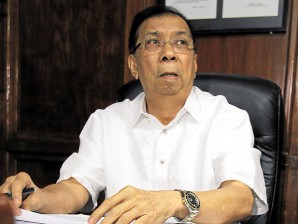MANILA, Philippines—Bureau of Corrections (BuCor) Director-on-leave Ernesto Diokno on Wednesday denied being involved in the grant of special privileges to homicide convict Jose Antonio Leviste, who was arrested last week after making an unauthorized trip out of the New Bilibid Prison (NBP).
Diokno, who appeared before a justice department panel investigating the possible administrative liability of BuCor officials in the Leviste incident, said the grant of special privileges and the monitoring of their exercise lay with the superintendents of the various state penitentiaries, of which the NBP is one.
Diokno said he had issued a memorandum to the superintendents to monitor the enforcement of prison regulations, but admitted that he did not always stringently monitor the implementation of his instructions.
“I’m not obliged to guard them [the prisoners], I’m just concerned with policymaking,” said Diokno.
Senior State Prosecutor Susan Dacanay, a panel member, found this unacceptable, saying Diokno’s duties and functions were expressly stated in the law.
No more figurehead
“You are not merely a figurehead there. You have specific functions stated by the law. This does not only involve policy, but also rules and regulations for the effective [administration] of the BuCor,” Dacanay said.
According to Diokno, shortly after assuming office last October, he held a command conference with NBP officials and with the leaders of the prison gangs—or “council of elders”—and warned then about the abuse of privileges.
At that time, “raw information” had reached his office that some VIP prisoners had been going out of the NBP premises without authorization
Diokno recounted warning the “elders,” who number about 40 and included Leviste, that he would not tolerate abuses and that he would have them arrested and charged.
Asked why he did not immediately cancel the “living in” and “sleep-out” privileges granted to inmates like Leviste, Diokno said he wanted to obtain concrete evidence first.
Though Diokno did not name him, the prison official who approved Leviste’s privileges was former NBP superintendent Armando Miranda, who has since been replaced by Ramon Reyes.
Diokno angered panel members when he said Miranda could not implement his orders because he [Miranda] was already “old.”
Diokno admitted that he did not regard sleep-out and living-in privileges as irregular, adding that this was one of the “best practices” at the NBP.
He explained that the BuCor has evolved from a purely punitive system in the treatment of prisoners to the “restorative and restitutive” system wherein convicts are reformed by making them contribute to the community while serving time.
BuCor manual
Diokno said he toured the NBP reservation and saw the hut built by Leviste near a river where the convict, who was working in an agro-farm project, was allowed to spend the night instead of returning to detention.
He said the former governor and his companions were raising tree seedlings for their “one billion trees” project.
Of Leviste’s privileges, Diokno said he thought the setup was wrong, but that he had not studied the matter very well because his priority was the drug problem in the reservation. He recalled that one of his deputies was recently murdered.
He blamed the drug problem on the government’s allowing people to settle within the NBP reservation.
Teodora Diaz, Diokno’s current deputy who is now acting director, justified the grant of privileges. She said that while the current BuCor manual does not mention any sleep-out and living-in privileges, the old manual did and the NBP has continued to grant the privileges since these were not in inconsistent with the provisions of the new manual.
The panel earlier discovered that the recommendation for the sleep-out privileges for eight inmates who were deployed at the agro-farm compound originally contained only eight individuals but when the approval came, Leviste’s name was included as the ninth beneficiary.
The panel established that the eight participants were chosen by a nongovernment organization, the BuCor Love Foundation, of which Leviste was a “core” member.
Justice Undersecretary Francisco Baraan III, the panel’s supervising officer, said the panel would study which of the prison officials would be charged administratively and criminally. The panel is expected to come up with a report by Friday.
Baraan said the panel would also look into the operations of the BuCor Love (for Livelihood Opportunities: Volunteers for Ex-Offenders) Foundation, to “see if NGOs like it were being used a source of unwarranted benefits.”
The foundation’s board of trustees is chaired by former Chief Justice Reynato Puno.
Up to Diokno
In Malacañang, Presidential Spokesperson Edwin Lacierda said the Palace was leaving it up to Diokno to respond to calls for him to resign to spare President Aquino from political embarrassment.
“We leave it to each public official the discretion to know what’s best for the country, what’s best for the President,” Lacierda told a news briefing.
He said Mr. Aquino was “not happy” about the incident and that was why Diokno, who is reputed to be close to the President, was summoned to Malacañang last week.
And while Diokno was appointed by Mr. Aquino, Lacierda said appointees were expected to perform and do their jobs. With a report from Christine Avendaño
